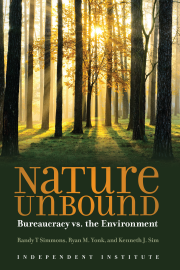With election season fast approaching, politicians and activists will amp up their calls for more environmental laws and regulations. What have past efforts brought us? The record is not as clean as many think.
Oregon’s Elliott State Forest offers an illuminating example of how environmental policies can backfire. The Elliott belongs to the state’s Common School Trust Lands. Any net revenue it generates (such as from logging) must by constitutional mandate go to public school districts across the state. Unfortunately, there’s been a major snag: Because the Endangered Species Act ended logging in the Elliott, the state can’t use the forest to benefit its schools.
Oregon’s dilemma is one example of how the costs of environmental regulations can outweigh the benefits, but there are countless others.
While researching our new book, Nature Unbound: Bureaucracy vs. the Environment, we found that major federal environmental policies—governing air pollution, water pollution, endangered species, wilderness, and renewable energy—have fallen far short of their goals or even inflicted harm on the environment. They’ve also harmed the economic, legal, and political institutions that promote human flourishing.
One cause of the problem is the way we romanticize nature. Politicians can exploit this love-blind passion to win support for policies that ultimately harm the environment—and our own health and well-being—but which serve their own interests. (Often this means favoring special interests who will support the politicians at election time.)
This modus operandi, which is not the monopoly of any political party, is a species of what we call “environmental political entrepreneurship.”
Not every instance of environmental political entrepreneurship is harmful, however. In Nature Unbound we discuss six basic principles to guide policymakers and activists who genuinely seek to improve the environment and fix the worst federal policies.
Our recommendations will take root, of course, only if more people gain a better understanding of how the right kind of activism can safeguard environmental amenities and restore our economic, legal, and political ecosystem.
Nature Unbound has planted the seeds. Now it’s up to the public to water them.














